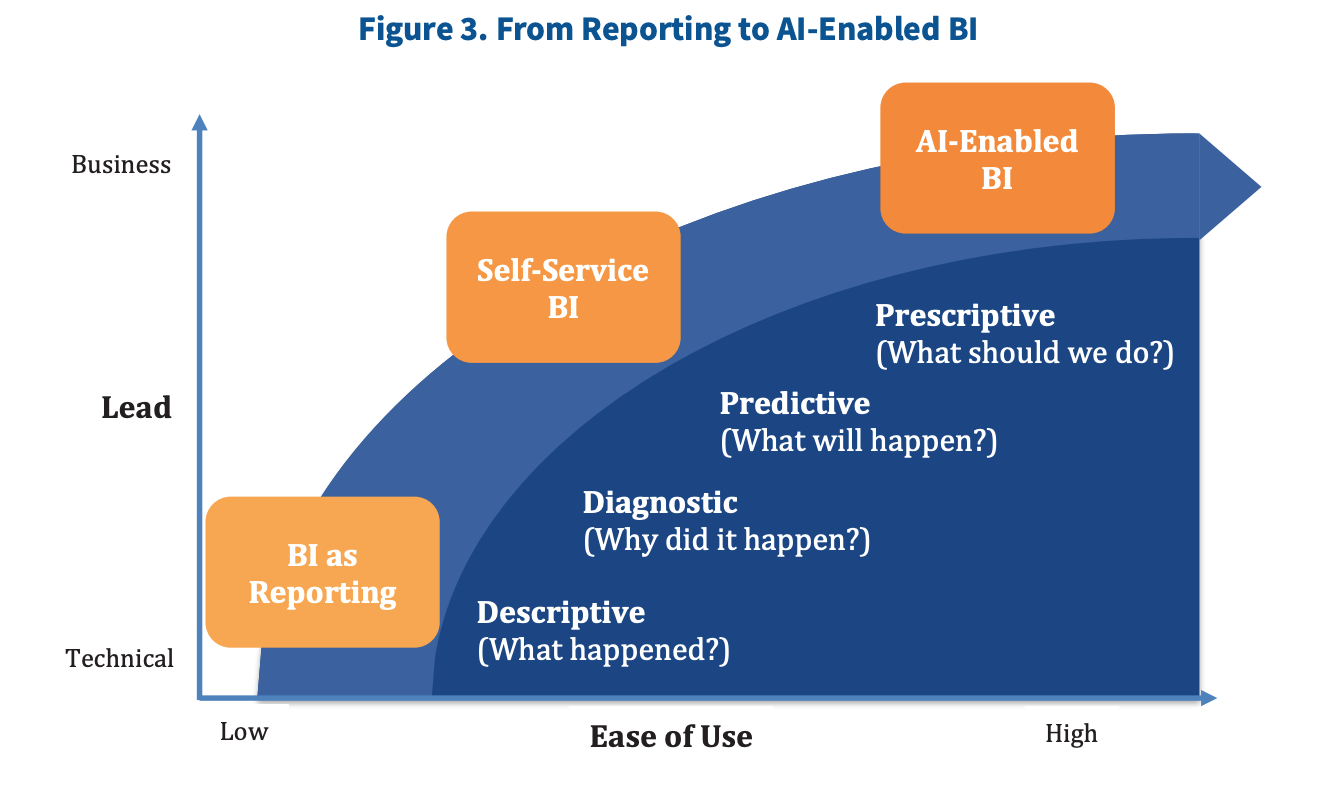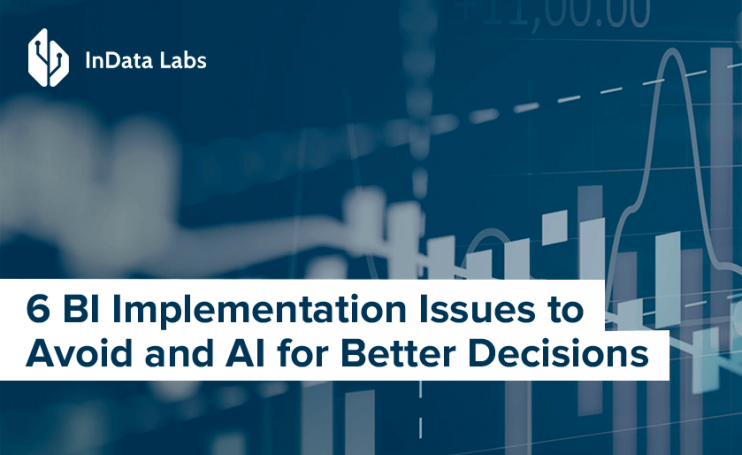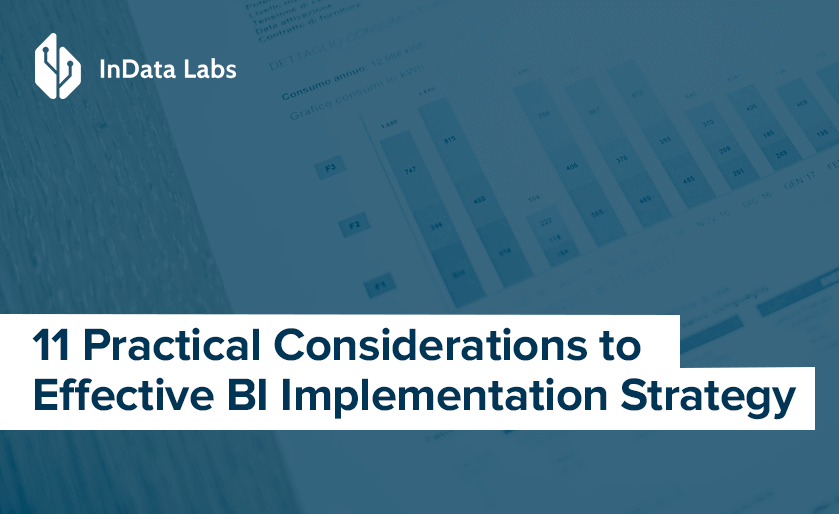Business intelligence (BI) is a set of strategies and tools that companies can employ to handle the analysis of business data. The tools and solutions, especially custom-made ones, facilitate the work of experts in monitoring KPIs of business, analyzing fast-changing market realities and factors impacting performance. To opt for business intelligence solutions is a trend that is here to empower business owners to make decisions based on rich data, not their gut instinct.
A 2-minute video review of this article.
This video is made using InVideo.io
AI Increases Analytics Literacy and Impacts Decision Making
Companies effectively use BI apps to thrive and maintain leading positions against competitors. But modern BI tools and implementation techniques may demand of a business user having the technical know-how on the ways to develop and implement valuable data analytics models. Thanks to AI, data science tasks and data analytics are becoming more understandable for users with no technical background. Custom AI-enabled BI solutions come out user-friendly enough so that not to get lost in the jungle of analytics.
As researchers from Eckerson Group allege, “AI is going to make BI more accessible and valuable for average business users.” Business data analysis will be feasible for all types of users. Interpreting data and preparing optimal data-based responses to different events will become much easier.
Automated insights can aid companies to grasp the knowledge of customer needs, keep pace with market tendencies, and forecast changes. BI and analytics include gathering, transforming, and analyzing massive amounts of data. So, using AI to optimize working with big data was just a matter of time. AI injections allow to improve more traditional and restrained BI solutions.
On the graphic below, you can see how the goals of employing BI apps and their complexity have changed over time.

Source: IBM.com
AI enables BI to go much farther than just the provision of analytical reports and creation of complicated custom dashboards. The required manual input and related issues have been minimized with the AI implementation.
However, AI isn’t going to replace BI. It makes BI tools more powerful: allows generating more useful insights, increases productivity, and uncovers time- and money-saving opportunities.
Augmented Analytics Is the Future of BI
AI is gradually becoming a part of every existing technology reshaping standards and creating new approaches and categories. As Gartner analysts admit, we are heading to the future, where smart devices will deliver “increasingly insightful digital services” all around.
One of the trends that Gartner In the chart of Top 10 Strategic Technology Trends for the current year is augmenting data and analytics capabilities with AI. Augmented analytics allows data scientists to use powerful algorithms to explore more data and swiftly arrive at correct inferences instead of doing guesswork.
AI tools identify and bring to the surface plenty of hidden patterns. Previously, this type of work would take data analysts hours or even days. Intelligent tools also help avoid or completely remove personal bias. Automated insights allow businesses to avoid risks of making critical decisions based on irrelevant data.
Gartner predicts that over 40% of data science tasks will be automated by the year 2020. Businesses that adopt AI-driven approaches and technology innovations for existing practices today will harvest immense benefits in the foreseeable future. Share on X
Getting Inspired by Global Leaders
Harnessing AI-enabled BI solutions may raise doubts about their effectiveness. Let’s find out the factors in favor of BI implementation by industry giants.
 Walmart, a retail corporation operating more than 11,000 stores, uses BI applications to process massive volumes of transaction records. An AI-enabled BI app helps Walmart operate back office faster and control related costs better.
Walmart, a retail corporation operating more than 11,000 stores, uses BI applications to process massive volumes of transaction records. An AI-enabled BI app helps Walmart operate back office faster and control related costs better.
Many enterprise business processes are linked to unexpected changes. AI-enabled solutions can be of use for detecting any possible options. For instance, if warehouse processes are under the control of AI, data on item handling and storage operations can be gathered and processed in a very brief period. The output will then be used to support or optimize processes better.
 General Electric uses AI to digitize and monitor physical equipment. Predictive maintenance is crucial for effective production and sustainable performance. That is why the company employs AI capabilities to process the historical data of equipment.
General Electric uses AI to digitize and monitor physical equipment. Predictive maintenance is crucial for effective production and sustainable performance. That is why the company employs AI capabilities to process the historical data of equipment.
Also, powerful BI tools can be used to gather and record information from all over the world, for instance, for monitoring oil pipelines. The data retrieved as an outcome aids to forecast emergency cases or allocate resources more efficiently.
 Avanade, a joint venture between Microsoft and Accenture, leverages predictive analytics for the insurance area. The use of customer and policy data helps get data-based insights, promote the company’s growth, and results in increased revenue.
Avanade, a joint venture between Microsoft and Accenture, leverages predictive analytics for the insurance area. The use of customer and policy data helps get data-based insights, promote the company’s growth, and results in increased revenue.
Be Aware of Common BI Implementation Mistakes
By using AI-led BI tools, your company’s top management will be able to make efficient data-based decisions. Hypotheses will be driven out, and you will be guaranteed to receive accurate, relevant, and transparent insight into your business processes. But to reap the rewards of your BI project, you need to take into account common BI implementation issues.
Valuable data. The use of irrelevant or inaccurate data to generate automated insights can cause real problems. Much of your BI implementation may be building data review processes. The need becomes more acute while conducting situational analysis for a situational BI implementation. You may need to combine data from internal and external sources or purchase third-party data.
Accurate analysis. Streamlined data analysis can yield excellent results in analyzing existing reports and data origins to help understand customer needs. A BI app should enable discovering anomalies and inconsistencies in data, detecting disparities, and understand their nature.
Anomaly resolution. With the assistance of a BI app, it should become possible to design and implement ways to resolve issues with data. The solutions should enable collecting and providing information on inconsistencies in a clear and user-friendly format.
Cloud BI implementation problems. Many companies adopt hybrid BI that combines on-premise systems and cloud-based solutions in one. Using cloud-based solutions may incorporate potential risk factors.
First, in case BI implementation involves migrating to the cloud, it will be necessary to push massive amounts of data into the cloud and develop an archival strategy. Second, a company will have less control over the ways employees use cloud services. Third, many businesses need to stay compliant with different regulations, but the use of cloud solutions may be related to receiving a non-compliance status. Fourth, data stored in the cloud is more vulnerable to malware, which can result in lack of customer trust and increased customer churn.
Available and recoverable system. BI systems should capture massive amounts of data in real-time and shouldn’t affect other processes on a source or target system. User queries need to be processed in seconds, and reports must be updated dynamically.
To allow avoiding related BI implementation failures, the time to recover from a server failure should be short enough. Thus, it is crucial to opt for a safe and highly-available system with robust backup and recovery.
Reasonable costs. For a startup company, small-, or mid-sized business, it can be vital to find a vendor that offers scalable solutions with minimal overall costs. To save time looking for assistance with BI implementation, you can partner with a reliable BI implementation service provider offering flexible solutions to companies of all sizes.
BI solutions augmented with AI have already become a trend. They have proved its great value for businesses across various industries. AI makes BI easier for business users, automates tasks, and provides valuable insight within the shortest possible time. It ensures efficient automation of routine tasks and increases in productivity. A first-rate AI-enabled BI solution can guarantee the delivery of on-time, relevant, and accurate insight into the existing workflows.
Start Your BI Implementation Project with InData Labs
Have a project in mind but need some help implementing it? Drop us a line at info@indatalabs.com, we’d love to discuss how we can work with you.

